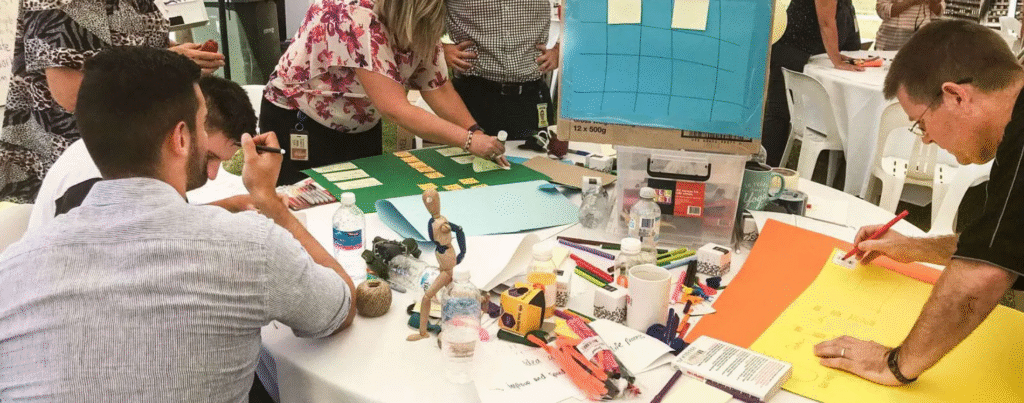In today’s competitive and fast-changing business landscape, organizations face increasingly complex challenges. A Design Thinking Facilitator plays a pivotal role in helping teams approach these challenges creatively, ensuring that solutions are user-centered, practical, and innovative. Facilitators guide workshops where participants learn to empathize with users, generate new ideas, prototype concepts, and test solutions—all within a structured and supportive environment.
Design Thinking workshops led by skilled facilitators focus on hands-on problem-solving and collaborative learning. Participants gain practical experience applying design thinking methods to real-world challenges, improving their ability to develop actionable and sustainable solutions.
What Is a Design Thinking Facilitator?
A Design Thinking Facilitator is a professional who guides teams through the Design Thinking process, encouraging collaboration, creativity, and critical thinking. Unlike traditional managers, facilitators do not provide solutions; instead, they create an environment where participants can explore ideas, test concepts, and learn from iterative feedback.
Facilitators help teams overcome mental barriers such as fear of failure, fixed thinking, or uncertainty. By fostering a safe and inclusive space, they empower participants to contribute freely, experiment with ideas, and ultimately deliver more innovative outcomes.
The Five Key Stages of Design Thinking
The Design Thinking process is organized into five essential stages, which facilitators guide teams through:
- Empathize: Understand the needs, challenges, and experiences of users through observation, interviews, and research. This stage ensures that solutions are grounded in real human insights.
- Define: Clearly articulate the problem based on insights gathered during the empathy stage. A well-defined problem aligns the team and provides direction for the next steps.
- Ideate: Encourage participants to generate a wide variety of creative ideas. Facilitators use techniques like brainstorming, role-playing, and mind mapping to explore multiple possibilities without judgment.
- Prototype: Transform ideas into tangible concepts, such as sketches, models, or digital mockups. Rapid prototyping allows teams to test ideas quickly and refine them based on feedback.
- Test: Gather feedback from users to validate and improve solutions. Iterative testing ensures that outcomes are effective, practical, and aligned with real needs.
Enhancing the Process Beyond Core Stages
Skilled facilitators often incorporate additional techniques to maximize creativity and engagement:
- Address Internal Barriers: Helping participants overcome fear, self-doubt, and resistance to change.
- Effective Communication: Using positive, inclusive language to encourage collaboration and openness.
- Iterative Mindset: Reinforcing that innovation is a continuous process of testing, learning, and refining solutions.
Tools and Techniques Used by Facilitators
A Design Thinking Facilitator leverages a variety of tools to guide teams effectively:
- Human-Centered Design Tools: Persona development, journey mapping, and user interviews ensure solutions focus on real needs.
- Creative Exercises: Brainstorming, role-playing, and collaborative workshops stimulate innovative thinking.
- Rapid Prototyping: Creating early, low-cost prototypes to test ideas and iterate quickly.
- Structured Feedback Mechanisms: Collecting insights from users to refine and enhance solutions efficiently.
Benefits of Working with a Design Thinking Facilitator
Organizations that engage facilitators experience significant advantages:
- Improved Collaboration: Facilitators break down silos and encourage cross-functional teamwork.
- Enhanced Creativity: They create safe spaces where unconventional ideas can flourish.
- User-Centered Solutions: Outcomes are aligned with the real needs and desires of users.
- Faster Problem-Solving: Iterative prototyping and testing accelerate the journey from idea to implementation.
- Cultural Transformation: Facilitators foster a mindset of curiosity, experimentation, and continuous improvement throughout the organization.
Turning Ideas into Actionable Solutions
Design Thinking workshops led by facilitators are highly interactive and practical. Participants learn to empathize with users, generate innovative ideas, prototype solutions, and iterate based on feedback. Facilitators ensure that workshops are engaging, structured, and focused on actionable results, helping teams transform abstract challenges into real-world solutions that deliver measurable impact.
Conclusion
A Design Thinking Facilitator is an invaluable resource for organizations seeking to innovate strategically and solve complex problems effectively. By guiding teams through structured processes, fostering creativity, and keeping solutions user-focused, facilitators transform challenges into opportunities. Their expertise enables organizations to collaborate more effectively, innovate sustainably, and implement solutions that create lasting value.







